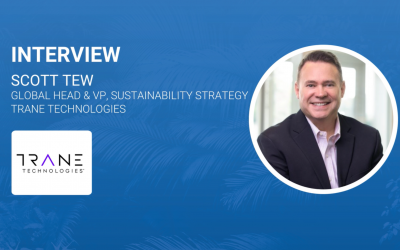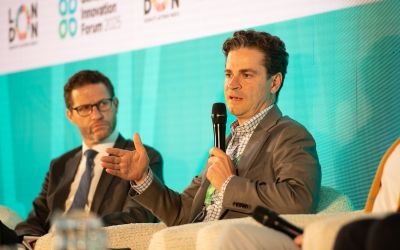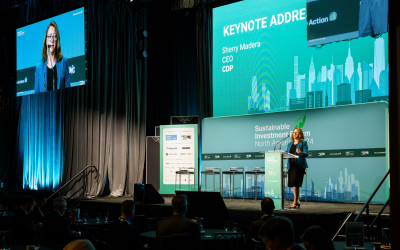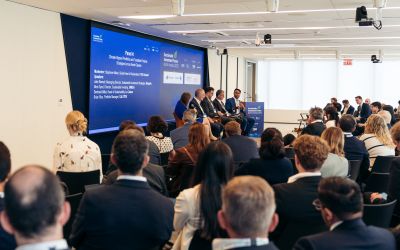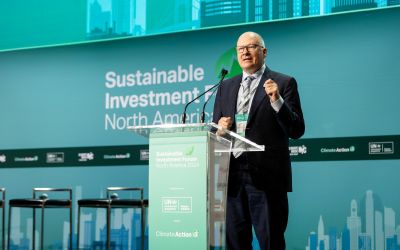Sanjay Tugnait on how the company has been supporting its clients in the transition to net zero
After the Sustainable Innovation Forum 2021, Climate Action caught up with Sanjay Tugnait, Chief Market Maker & Global Managing Partner - Sustainability Practice - IBM Consulting, to discuss how the company has been supporting its clients in the transition to net zero.

After the Sustainable Innovation Forum 2021, Climate Action caught up with Sanjay Tugnait, Chief Market Maker & Global Managing Partner - Sustainability Practice - IBM Consulting, to discuss how the company has been supporting its clients in the transition to net zero.
Can you tell us how IBM is working to achieve the Paris goals?
Over its 110-year history, IBM’s values have helped it make decisions that were right, before they were popular or mandated. IBM's environmental leadership is an example of that.
Exactly 50 years ago, in 1971, IBM's Chairman and CEO published a prescient, forward-looking corporate policy for environmental protection. And since then, IBM has achieved sustained and demonstrable results.
We’ve had voluntary goals for decades, and we continually increase our ambition.
Earlier this year, we established 21 new, updated, and refreshed environmental goals that will continue IBM’s legacy of environmental leadership.
These include our own goal to achieve net-zero greenhouse gas emissions by 2030. As part of that, the IBM Research Division is applying artificial intelligence to accelerate the discovery of new materials for carbon capture and support the effort to hold to the 1.5 C global warming target.
What sets IBM’s environmental work apart is transparency and authenticity.
Across our 50 years of environmental leadership, we have recognized a fundamental truth: achieving -- and sustaining -- environmental results requires clear, measurable targets affecting our actual operations.
Collaboration is going to be required on a scale never seen before if we are to achieve a global net zero economy. How can we utilise cross-sector partnerships to help accelerate the net zero transition?
Data is going to be at the heart of helping all organisations to make progress on their net zero goals. Until we have clear data around the use of carbon, the degree of carbon richness in our value chains and an ability to understand the impact we're having on reducing that carbon it's very hard for any organization to know whether it's making progress, where to focus its efforts or how to judge whether targets are being met.
A common thread across our own experiences and collaboration with clients is that the data needed to deliver these solutions is of significant scale, not held by any one business area or organisation or in any single format.
To achieve meaningful change, we need to break down organisational silos for controlling data building on open and secure platforms to allow insights to be delivered at speed to consumers and business alike. That can only be achieved through cross-sector partnerships taking a much more open, yet secure, approach to data access and control. We see sustainability needing to move at the speed of digital.
We need new ways of thinking and operating.
How have IBM been supporting their clients in the transition to net zero?
IBM is ideally positioned to help clients with their data challenges, using AI and open hybrid multi-cloud approaches that will enable the sustainable and responsible enterprises of the future.
We are working with IT leaders to design Responsible Computing frameworks that directly address contemporary concerns of climate, ethics and use of natural resources.
In addition we have built methods to allow our clients to capture, measure, benchmark and report on their ESG and SDG goals, which is foundational to our client’s journey to sustainability.
With our deep industry expertise we can help make net-zero happen with practical strategies that gain traction quickly while derisking delivery.
What is a sustainability focussed project that IBM is working on now that you are particularly excited about? (any new technologies/projects)
Cities are a key player in reducing energy consumption and carbon emissions – in fact cities currently absorb around 70% of our energy use, so they are a natural place to focus our attention.
The City of Copenhagen operates and maintains 3,600 buildings. With its 2025 goal in mind, it has set out to radically reduce the energy consumption of those buildings in the next five years.
To do this the City is building flexibility into its energy consumption by using its buildings as a means to respond to imbalances in the system.
IBM have teamed up with the City of Copenhagen to deliver on their 2025 goal by enabling them to improve access to renewable energy options through real-time adjustments of building’s cooling, heating, and ventilation equipment. This energy flexibility results in reduced carbon output and is also helping to change consumer and business behaviours.
What do you think are the key differentiators between how we have done things in the past and how we need to do things now and into the future to accelerate the global journey to Sustainability?
We see the there are four key factors to accelerate change: people, planet, purpose and profit. Learning from our own experiences and from collaborating with our clients we understand the challenges being faced by business in effectively putting sustainability at the core of their business strategies must balance all of these factors.
We also see that openness will be the key differentiator as we work to create the resilient and responsible enterprises of the future that will be characterized by:
· embracing open platforms with intelligent workflows
· proactively collaborating across ecosystems
· fostering an open approach to innovation with partners
· build a culture of trust and integrity - in one another and in the data being shared across new co-created value chains
Achieving net zero targets starts and ends with openness and data. We need to use today’s most plentiful resource to save the scarcest. We need to work together across new value chains and ecosystems, with technology helping us accelerate faster than we can go alone.
IBM are speaking at the Sustainable Innovation Forum 2021, to join them register here now.

